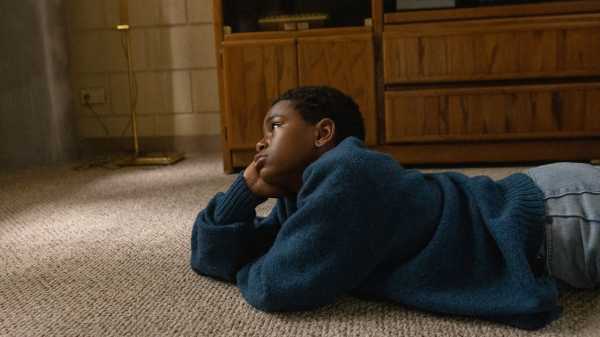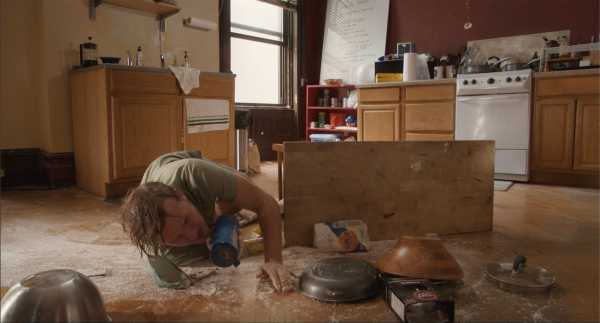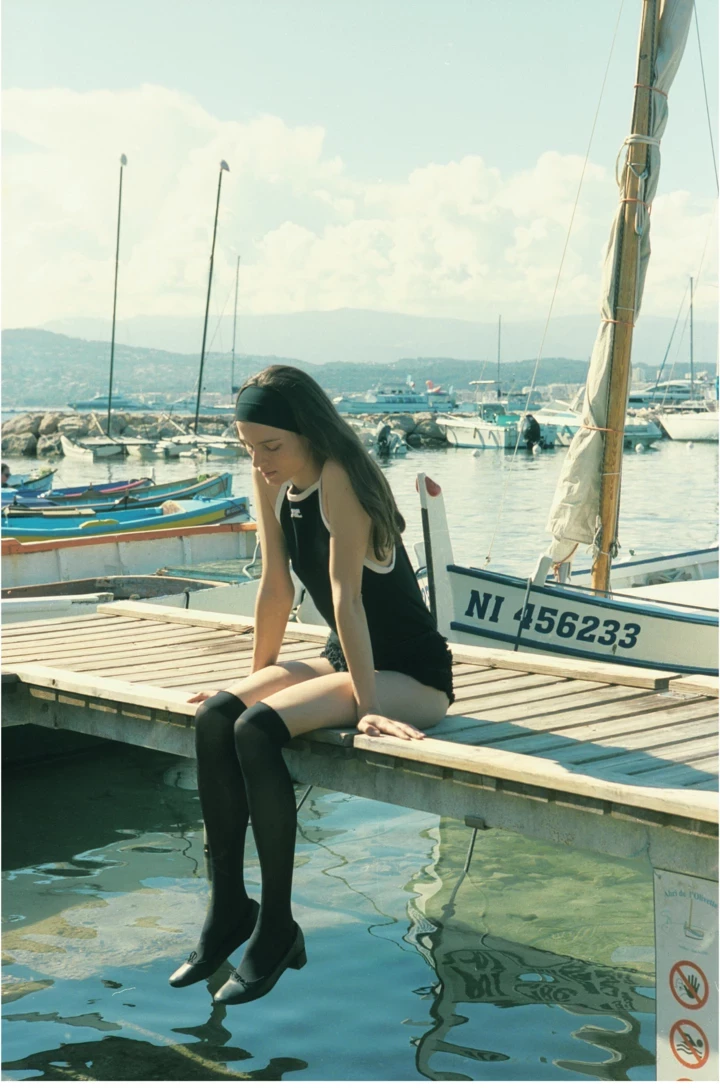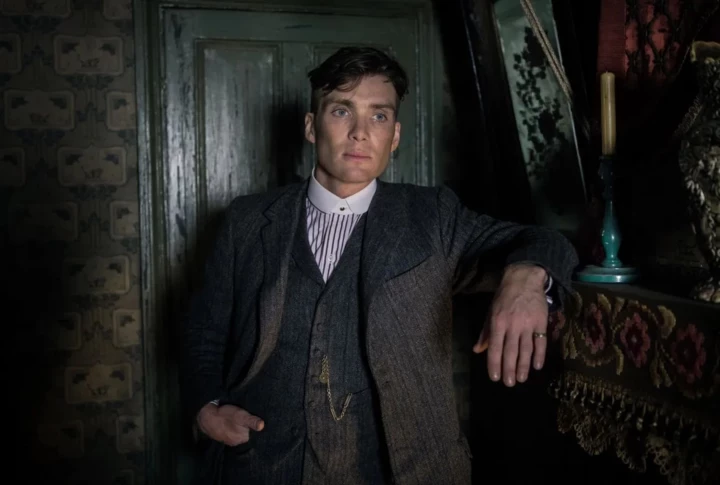
Save this storySave this storySave this storySave this story
At a glance, not much appears to connect Minhal Baig’s “We Grown Now” and Theda Hammel’s “Stress Positions.” Baig’s feature, her third as a writer and director (after “1 Night” and “Hala”), is a sweet-souled drama, set in Chicago in 1992, about two young Black boys living with their families in the Cabrini-Green housing project. Hammel’s movie, her directorial début, is a scrappy ensemble comedy, set in 2020, that follows a clutch of L.G.B.T.Q.+ Brooklynites during the early days of the pandemic. With gentle lyricism and an elegant compositional eye, Baig taps into the rough-edged wonderment of a difficult yet often strikingly beautiful childhood. Hammel, staging rapid-fire arguments and pratfalls with an agitated handheld camera, satirizes the cluelessness and privilege of a COVID-disrupted adulthood.
Both movies nonetheless emerge from, and even typify, two instantly recognizable strains of American independent filmmaking: the warmly observed coming-of-age drama and the pugnacious Hell-is-other-people comedy. These are among the more common subgenres often reductively given the label of “Sundance movie,” whether or not the movies in question actually played at Sundance. (“Stress Positions” premièred there earlier this year; “We Grown Now” first screened last fall at the Toronto International Film Festival.) What unites these two specimens, for all their differences, is a feel for domestic confinement, a poignant understanding of home as a place both fragile and stifling. What does “home” mean to these characters, if it means anything at all? The ironic presence of an American flag—solemnly saluted in one movie, accidentally set on fire in the other—kicks that question up a political notch or two.
In “We Grown Now,” the flag salute is presented as a montage of Chicago grade-school students, nearly all of them Black, as they pledge allegiance to a nation that has pledged them too little in return. Two of these classmates, Malik (Blake Cameron James) and Eric (Gian Knight Ramirez), are best friends and residents of Cabrini-Green, an enclosed, dilapidated world that Baig often films in slow-creeping zooms through dimly lit spaces. The initial impression, furthered by a droning soundscape that seems to swallow us up alongside the characters, is nearly that of a horror film, which would be fitting if redundant: both the 1992 supernatural thriller “Candyman” and its 2021 remake are largely set in a fictional Cabrini-Green that is haunted by a murderous, hook-handed bogeyman. But the dangers here are real, and not remotely supernatural. Crime and poverty are continual givens. One of Malik and Eric’s fellow-students is killed in a gang shooting just outside the complex. Following that tragedy, police descend on the scene, forcing residents to carry identification cards and bursting in on their apartments in the middle of the night, ostensibly searching for drugs.
Amid such fear and grief, Baig clings fast to goodness and beauty—and urges us to do the same. When the cops ransack Malik’s apartment, the camera finds relief in the courageous fury of his mother, Dolores (Jurnee Smollett), as she protests their actions, and also the protectiveness of his grandmother Anita (S. Epatha Merkerson) as she clings fast to him and his younger sister. Baig’s achievement is to neither exaggerate nor soft-pedal tough realities; she also shows us the joy and distraction that children, being children, have a way of finding under any circumstances. In one early sequence, Malik, Eric, and other neighborhood kids launch themselves onto a pile of old mattresses, their carefree shouts commingling with the ecstatically churning strings of Jay Wadley’s score. In a quieter, riskier moment, Malik and Eric lie on the floor of an empty apartment space and stare at the oppressive vault of the ceiling, willing it, in a hallucinatory reverie, into a starry vision of freedom.
The two young male leads have a wonderfully persuasive rapport, even when Malik and Eric’s scripted dynamic cuts along predictable lines. Eric is the tougher, more jaded one; you can see a carapace of cynicism, a why-bother stare, already hardened into place. But Malik, with his gently expressive eyes, hasn’t lost sight of his belief that life might still be beautiful and full of possibility. He’s not wrong; beyond the concrete towers of Cabrini-Green, the world beckons. One day, the boys ditch school, catch a train, goof around, engage with (mostly) friendly strangers, and find themselves at the Art Institute of Chicago. In one gallery, they spend a few transfixing moments in front of “Train Station,” Walter Ellison’s 1935 depiction of a bustling Southern terminal where white travellers board trains headed for Florida vacation spots; on the other side, Black passengers make their way north in search of employment.
The painting strikes an insistently meaningful chord in a movie that doesn’t always fully trust or embrace its childlike perspective, a lapse that becomes clear in the sometimes overly emphatic beats of its dialogue. (“We exist!” Malik and Eric scream through a chain-link fence from high up in their tower.) But the reference to the Great Migration reverberates nonetheless, especially in those moments when Baig shifts to the point of view of Malik’s mother. Stuck in a low-paying job that keeps her away from her family for long hours, Dolores is finally given an opportunity to advance, professionally and financially, yet it will mean uprooting her kids from Cabrini-Green and leaving Chicago behind. That her decision isn’t a simple one speaks to Baig’s feel for nuance, her understanding that the hardest homes can also be the hardest to leave. “We Grown Now” enfolds its characters, for all the anguish and upheaval flowing around them, in a bittersweet sense of belonging.

John Early in Theda Hammel’s “Stress Positions.”Photograph courtesy NEON
The youngest character in “Stress Positions” is Bahlul (Qaher Harhash), a Moroccan-born model who’s about to turn twenty. He has doubtless had happier birthdays. This one finds him laid up with a broken leg and recuperating under the distracted gaze of an uncle, Terry (John Early), during the hot and deadly summer of 2020. Terry, for his part, is still reeling after being dumped by his mostly offscreen husband, Leo (John Roberts), who owns the Brooklyn brownstone apartment where they’re sheltering. It’s an awkward set of circumstances, necessitated by pandemic protocols that Terry, who’s easy to rattle and quick to scold, observes more conscientiously—but not really more effectively—than those around him. Between his pending divorce and the stress of caring for his nephew, he’s such a clumsily flailing ball of rage and anxiety that he can scarcely strap on a cumbersome gas mask, or join in the evening ritual of banging pots and pans, without hurting himself—or, in one early tumble, slipping on a raw piece of chicken that finds its way underfoot. A banana peel would have been too obvious.
The problem with “Stress Positions” isn’t that it feels like a too-little-too-late addition to the overcrowded annals of low-budget lockdown cinema. (As grateful as many of us would be never to see an N95-masked face in a movie again, I’m theoretically more interested in hearing from filmmakers on the subject now, with the benefit of greater time and distance, as the initial outbreak continues to recede into period-piece territory.) The more relevant problem is that Hammel, who wrote the script with Faheem Ali, shoves us into this mid-pandemic tumult with what often feels like an automatic expectation of laughter, as if our memories of those wretched days would be enough to trigger guffaws of recognition. Indeed, as the movie continues, the pandemic itself comes to seem ever more like scaffolding—an excuse to isolate a few bickersome characters in their own narrative pod for ninety-five minutes and record the claustrophobic epic of dysfunction and vitriol that emerges.
The results are alternately sharp and scattershot, with a range of supporting eccentrics dipping in and out of the action: a silent scene-stealer of an upstairs neighbor (Rebecca F. Wright), a tetchy lesbian novelist (Amy Zimmer), and a genially randy Grubhub courier (Ali). Gradually, though, “Stress Positions” coalesces around the rapport between Bahlul, an object of much prying curiosity among the group, and Karla, a transgender massage therapist who reveals herself as the movie’s snarky, self-aggrandizing heart. (No wonder: she’s played by the director herself, in a wittily assured performance.) In a choice that lends the story its oddly vaporous yet distinctive shape, Karla and Bahlul are granted parallel interior monologues; Karla lays out much of their background early on, whereas Bahlul, an aspiring writer, mostly reminisces about his mother (Terry’s sister), unseen apart from a few hazily shot flashbacks.
If Karla and Bahlul emerge as the most intriguing characters here, it’s because they’re also the least understood, the ones most susceptible to the thoughtless assumptions and blind spots of others. Karla describes her battle with suicidal impulses before her transition and skewers Terry for what she perceives as his gay-male privilege; Bahlul, meanwhile, gives both of them a much-needed cultural and geography lesson, taking pains to remind them that Morocco is not, in fact, part of the Middle East. Unwieldy as it is, the movie does stumble into a messily insightful snapshot of the casual ignorance and bigotry that gets flung back and forth in everyday conversation, even among proudly progressive folk and often under the guise of keeping-it-real honesty. By the time a Fourth of July barbecue rolls around and the Stars and Stripes accidentally goes up in flames, the burning flag can’t help but register as a barbed throwaway gag, aimed at America and its false promise of equality for all. A liberation of sorts finally arrives by the end of “Stress Positions,” but it’s a sad and lonely kind of liberation, with the promise of months of isolation still to go. ♦
Sourse: newyorker.com







